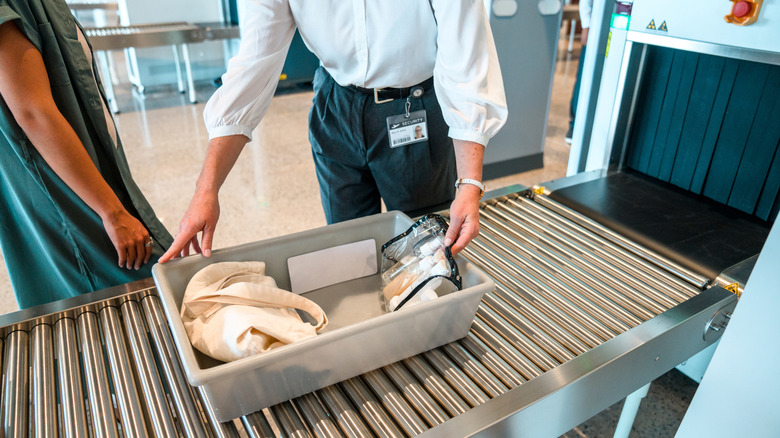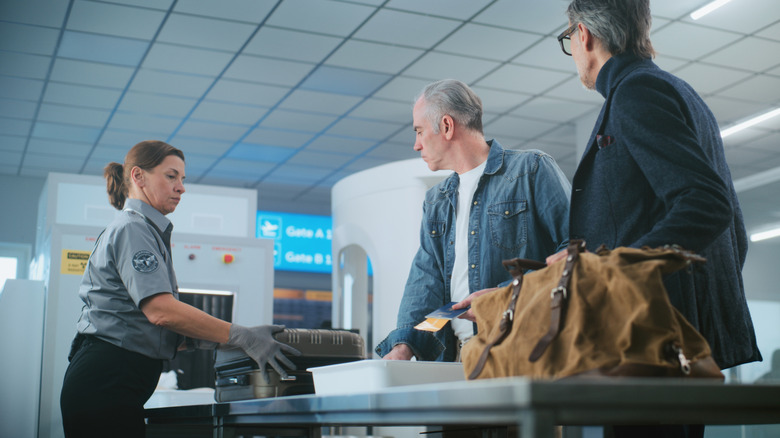TSA Rules On Toiletries In 2025: What You Can And Can't Bring
Whether you're leaving everything in your bag or putting your toiletries in a tray for a trip through the X-ray, TSA procedures often differ from airport to airport, confusing passengers. While many of the long-standing TSA rules are clear cut (the 3-1-1 liquids rule, no weapons or blunt objects, laptops must power up), there is a bit of confusion about what specific toiletries, medicines, and electronic equipment can pass through the scanners. In 2025 alone, TSA has made big changes to airport security, and by the look of things, more changes will be coming soon.
TSA's role is to ensure the safety of the traveling public and cargo at airports in a constantly changing environment, and on its website, it states that travelers "may notice changes in our procedures from time to time." Many of these changes have been made due to direct threats from faulty electronics or attempted terror attacks using liquids or footwear. In 2025, the agency is taking additional steps to be proactive, rather than reactive, due to the risk of lithium batteries on planes. While TSA has teased ditching the 3-1-1 rule – meaning you'll be able to carry a full tube of toothpaste or shampoo in your carry-on — you still may need to keep your soaps and toner in your checked bags to make room for your lithium battery-powered hair straightener. According to the TSA regulations, these devices are only allowed in carry-on bags and cannot go under the plane, due to the TSA's ban on lithium batteries (in power banks, computers, and battery-powered hair accessories) in checked luggage. If your hair straightener uses a butane cartridge, you will not be able to bring a spare cartridge in your luggage, period.
New items allowed through security
Throughout 2025, TSA has made huge changes to airport security due to technological changes. You won't need to take off your shoes anymore, and you can bring 11 types of liquids in containers greater than 3.4 ounces through the checkpoint. The list includes baby food and formula, and duty-free items, along with some strange ones like live fish and fresh eggs, as well as certain types of medicines that are deemed by TSA to be "medically necessary." Though the TSA agent may prevent you from bringing a full bottle of cough medicine or a bottle of heartburn medication without a doctor's note or prescription, you're still allowed to bring it in your checked luggage. If you are going to a foreign country, be sure to double-check the local regulations if you're packing these common medicines.
As you go through the checkpoint, be sure to place the medicine in its own plastic bin to be screened separately, and notify the officer that these are medical products. If you aren't sure about whether your liquid medicine will be deemed "medically necessary," opt for a dry form. The TSA does not limit the amount of pills, capsules, or tablets that a passenger can carry through security. If you need to take medicine while waiting for your flight, don't forget to bring an empty water bottle to the airport.
Other changes to airport security in 2025
TSA's policy changes this year have not only affected what and how you'll have to pack to go through security, but also the entire airport security experience. Earlier in 2025, TSA began enforcing the REAL ID Act, requiring passengers to carry acceptable forms of identification to pass through the checkpoint. While it has slowed down some passengers who have had their REAL ID rejected, the TSA and the Department of Homeland Security have developed new programs to speed passengers through screening. In July 2025, the Department of Homeland Security announced new family-only and military family-only lines at some air hubs, along with discounted PreCheck bundle memberships for families. TSA has also implemented new PreCheck Touchless ID lines using facial recognition technology at several airports across the country, cutting down passengers' waiting time.
Even with all of the changes this year, Kristi Noem, the secretary of the Department of Homeland Security, and Adam Stahl, the deputy administrator for the TSA, have discussed more major changes to security lines as we know them. Noem has raised the idea of passengers passing through security in as little as one minute, while Stahl stated in a Fox News interview that security may be "fully frictionless" and "automated" in the coming years. If you're flying through Denver International Airport, Newark, Las Vegas, LaGuardia, LAX, or Sea-Tac, you may see some of these changes in the works; these airports have recently added body scanners using millimeter wave technology that can screen passengers in the blink of an eye.


